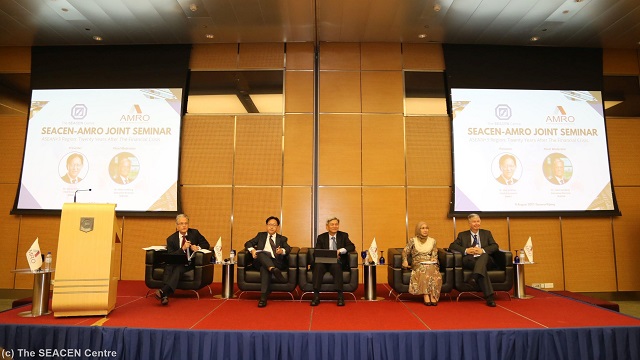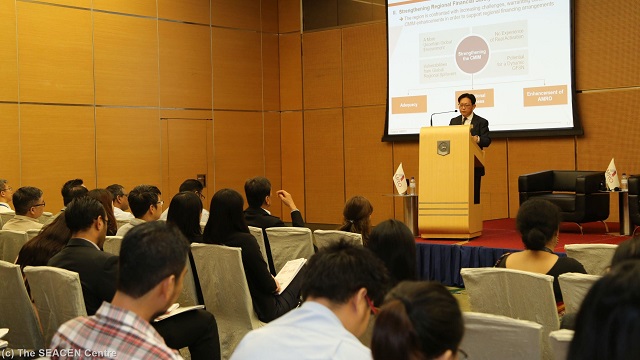
Distinguished panelists discussed the lessons learned from the Asian Financial Crisis at the SEACEN-AMRO joint seminar in Kuala Lumpur on August 11, 2017. From left to right: SEACEN Executive Director Dr Hans Genberg; AMRO Chief Economist Dr Hoe Ee Khor; Sunway University Professor Dr Yeah Kim Leng; Bank Negara Malaysia (BNM) Assistant Governor Puan Norzila Abdul Aziz; and SEACEN Director of Financial Stability and Payment Systems Mr Glenn Tasky.
KUALA LUMPUR, MALAYSIA, August 11, 2017 – Lessons learned from the Asian Financial Crisis 20 years ago underscore the importance of building resilience to withstand shocks, while having adequate buffers and sufficient policy flexibility to respond to crisis, as highlighted by experts at a joint seminar organized by the SEACEN Centre and the ASEAN+3 Macroeconomic Research Office (AMRO) on August 11, 2017, in Kuala Lumpur, Malaysia.
The seminar saw a good turnout, representing a mix of private and public sector participants, including analysts, academia, as well as other regional policymakers. The seminar focused on the region 20 years after the Asian Financial Crisis (AFC), which formed the thematic chapter in the ASEAN+3 Regional Economic Outlook (AREO) 2017 released by AMRO in early May.
AMRO Chief Economist Dr Hoe Ee Khor, in his keynote presentation, highlighted that the AFC was a landmark event, which shaped policymakers’ perspectives on crisis management and resolution. While there was a period of economic consolidation after a sharp negative shock, including painful policy adjustments, the region has made substantial progress in rebuilding the foundations for growth and stability through extensive reforms, such as in the corporate and financial sectors. On the policy front, affected economies undertook policy reforms such as developing a more robust monetary policy framework and strengthening regulatory and supervisory oversight of the financial sector. This has enabled the region to weather the Global Financial Crisis (GFC) from a position of strength.
Looking ahead, the outlook for the region remains challenging, given the tension between short-term growth and financial stability objectives at a time when policy space has generally narrowed. In the medium term, Dr Khor highlighted the need to strengthen regional financial safety net, while remaining steadfast in accelerating structural reform agenda to ensure continuous income convergence in the longer term.

AMRO Chief Economist Dr Hoe Ee Khor delivers a presentation on the lessons learned from the AFC.
The presentation was followed by a panel discussion moderated by SEACEN Executive Director Dr Hans Genberg and comprising Dr Hoe Ee Khor; Dr Yeah Kim Leng; BNM Assistant Governor Puan Norzila Abdul Aziz; and SEACEN Director Mr Glenn Tasky.
The panel agreed that in the current uncertain global environment, the AFC/GFC continues to offer valuable lessons to policymakers. The region should closely monitor the risks arising from financial markets and capital flows volatility. Due to the close interconnectedness of global financial markets, the contagion risks can be high, and therefore, it remains essential for policymakers to have a good policy coordination mechanism and sufficient policy flexibility to manage crisis events effectively.
The panel also discussed the potential for risks to evolve, often taking a different form, which makes it difficult to identify the next source of financial crisis. For instance, the proliferation of shadow banking activities, and the advent of financial technology (fintech) have made it even more challenging to identify sources of vulnerabilities.
The panel agreed that strengthening macroeconomic fundamentals and the resilience of the financial sector to absorb shocks remain key. The panel also discussed the need for greater financial cooperation within the region to deal with external shocks. In this regard, efforts to further enhance the Chiang Mai Initiative Multilateralisation (CMIM) should be continued.
As one of the countries affected by the AFC, Malaysia has undertaken fundamental policy reforms, both in the corporate and financial sectors, such as in areas of governance, and risk-based regulatory and supervisory framework. Malaysia also undertook deliberate policy to deepen its market capitals, which helped to better diversify sources of financing in the country. These reforms have helped Malaysia to withstand the recent financial market turbulence.
